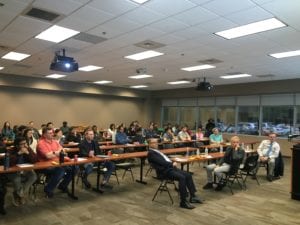IEEE Tallahassee PES Chapter Presentation
Title: How to Write an Effective Technical Paper
Presenter: Saifur Rahman, Ph.D., Joseph Loring Professor & Director, Advanced Research Institute
Virginia Tech, USA
President, IEEE Power & Energy Society 2018 & 2019; IEEE President-elect Candidate 2020
Time: 4:00 – 5:00 PM, Friday, August 14, 2020
Location: Join Zoom Meeting
Meeting ID: 931 9953 2966
Passcode: TLHPES
Abstract
In this presentation, Prof. Saifur Rahman will highlight issues with paper structure, conference vs. journal papers, ethics, where to publish, open access, impact factor, etc. He will also highlight the IEEE publications business, the value and quality of IEEE publications, and the broad topical areas IEEE publications cover.
Bio of Professor Saifur Rahman
Professor Saifur Rahman is the founding director of the Advanced Research Institute at Virginia Tech, USA where he is the Joseph R. Loring professor of electrical and computer engineering. He also directs the Center for Energy and the Global Environment. He is a Life Fellow of the IEEE and an IEEE Millennium Medal winner. He was the president of the IEEE Power and Energy Society (PES) for 2018 and 2019. He was the founding editor-in-chief of the IEEE Electrification Magazine and the IEEE Transactions on Sustainable Energy. He has published over 140 journal papers and has made over four hundred conference and invited presentations. In 2006 he served on the IEEE Board of Directors as the vice president for publications. He is a distinguished lecturer for the IEEE Power & Energy Society and has lectured on renewable energy, energy efficiency, smart grid, energy internet, blockchain, IoT sensor integration, etc. in over 30 countries. He is the founder of BEM Controls, LLC, a Virginia (USA)-based software company providing building energy management solutions. He served as the chair of the US National Science Foundation Advisory Committee for International Science and Engineering from 2010 to 2013. He has conducted several energy efficiency, blockchain and sensor integration projects for Duke Energy, Tokyo Electric Power Company, the US National Science Foundation, the US Department of Defense, the US Department of Energy and the State of Virginia. He has a PhD in electrical engineering from Virginia Tech.

=========================================
IEEE Tallahassee PES Chapter Presentation
Title: Role of the Smart Grid in Facilitating the Integration of Renewables
Presenter: Saifur Rahman, Ph.D., Joseph Loring Professor & Director, Advanced Research Institute
Virginia Tech, USA;
President, IEEE Power & Energy Society 2018 & 2019; IEEE President-elect Candidate 2020
Time: 4:00 – 5:00 PM, Thursday, August 13, 2020
Location: Zoom: https://fsu.zoom.us/j/92366785554?pwd=VGV0d09NRjE1RkI5NTNXMGpMTUpEdz09
Meeting ID: 923 6678 5554
Passcode: TLHPES
AbstractWith the focus on environmental sustainability and energy security, power system planners are looking at renewable energy as supplements and alternatives. But such generation sources have their own challenges – primarily intermittency. It is expected that the smart grid – due to its inherent communication, sensing and control capabilities – will have the ability to manage the load, storage and generation assets (including renewables) in the power grid to enable a large-scale integration of distributed generation. In a smart grid, information about the state of the grid and its components can be exchanged quickly over long distances and complex networks. It will therefore be possible to have the integration of sustainable energy sources, such as wind, solar, off-shore electricity, etc. for smoother system operation. But in order for this to be possible, the electric utility will have to evolve, and change their ways of operation to become an intelligent provider of these services. This lecture introduces the operational characteristics of renewable energy sources, and various aspects of the smart grid – technology, standards and regulations. It also addresses the interplay among distributed generation, storage and conventional generation to provide an efficient operational strategy in the context of the smart grid.
Bio of Professor Saifur Rahman
Professor Saifur Rahman is the founding director of the Advanced Research Institute at Virginia Tech, USA where he is the Joseph R. Loring professor of electrical and computer engineering. He also directs the Center for Energy and the Global Environment. He is a Life Fellow of the IEEE and an IEEE Millennium Medal winner. He was the president of the IEEE Power and Energy Society (PES) for 2018 and 2019. He was the founding editor-in-chief of the IEEE Electrification Magazine and the IEEE Transactions on Sustainable Energy. He has published over 140 journal papers and has made over four hundred conference and invited presentations. In 2006 he served on the IEEE Board of Directors as the vice president for publications. He is a distinguished lecturer for the IEEE Power & Energy Society and has lectured on renewable energy, energy efficiency, smart grid, energy internet, blockchain, IoT sensor integration, etc. in over 30 countries. He is the founder of BEM Controls, LLC, a Virginia (USA)-based software company providing building energy management solutions. He served as the chair of the US National Science Foundation Advisory Committee for International

============================================
Panel Discussion for grad students on preparing for careers in academia, research, and industry

4-6 PM, Wednesday, February 26, 2020 – CAPS Seminar Room120
Panels:
Dean Murray Gibson Fellow, Fellow of the National Academy of Inventors
Prof. Anant Agarwal, Fellow, IEEE
Prof. Gian Carlo Montanari, Fellow, IEEE
Dr. Syed Ahmed
=============
Attendance
2 IEEE Members
47 non-IEEE members or students

============================================
Title: Toward a More Resilient Cyber-Physical Power Grid with High Penetration of Distributed Energy Resources
Presenter: Dr. Junbo Zhao, ECE Department, Mississippi State University, Starkville, MS
Time: 2:00 -3:00 PM, Thursday, January 30, 2020
Location: Seminar Room 120, Center for Advanced Power Systems, 2000 Levy Avenue, Tallahassee, FL 32310
Note: Refreshments will be served
Abstract
The increasing penetration of stochastic and uncertain inverter-based distributed energy resources (DERs), such as wind and solar PV, has a considerable influence on the power system dynamics, and the total inertia of the power grid is reduced significantly, causing reliability and resiliency concerns. Furthermore, the dependent of information and communication technology for smart grid development has increased the range of cyber vulnerabilities. To enable a safe cyber-physical power grid transition, tools and methods for enhanced modeling, situational awareness, uncertainty quantification and security assessment are in urgent demand. This talk will present a set of synchrophasor-based grid-eye developments for situational awareness, such as dynamic state and parameter estimation, frequency divider, cyber-attacks detection, etc., the probabilistic grid security assessment and uncertainty quantification tools to manage intermittence and risks caused by the high penetration of DERs.
Bio of Dr. Junbo Zhao
Dr. Junbo Zhao is currently an Assistant Professor at Mississippi State University, Starkville, MS, USA. He received the Ph.D. degree from the Bradley Department of Electrical and Computer Engineering, Virginia Tech, Blacksburg, VA, USA, in 2018. He was a Research Assistant Professor at Virginia Tech from May 2018 to August 2019. He did the summer internship at Pacific Northwest National Laboratory from May to August 2017. He is currently the Chair of IEEE Task Force on Power System Dynamic State and Parameter Estimation, the chair of Cyber-Physical Interdependency for Power System Operation and Control working group, and the Secretary of the IEEE Task Force on Synchrophasor Applications in Power System Operation and Control. His current research works are supported by NSF, DOE, PNNL and LLNL. He has written three book chapters and published more than 60 peer-reviewed journal and conference papers. His research interests are cyber-physical power system modeling, estimation, security, dynamics and stability, uncertainty quantification, robust statistical signal processing and machine learning for smart grid. He serves as the Associate Editor of International Journal of Electrical Power & Energy Systems, Editor of IEEE Transactions on Power Systems and IEEE Power and Engineering Letters, and the subject editor of IET Generation, Transmission & Distribution. He is the receipt of best paper award of 2019 IEEE PES ISGT Asia as well as the best reviewers of 2018 IEEE Transactions on Power Systems and 2019 IEEE Transactions on Smart Grid.

Junbo Zhao, Ph.D. ECE Department, Mississippi State University, Starkville
==============================
Attendance – total 39
IEEE member – 26
Non-IEEE member – 13

